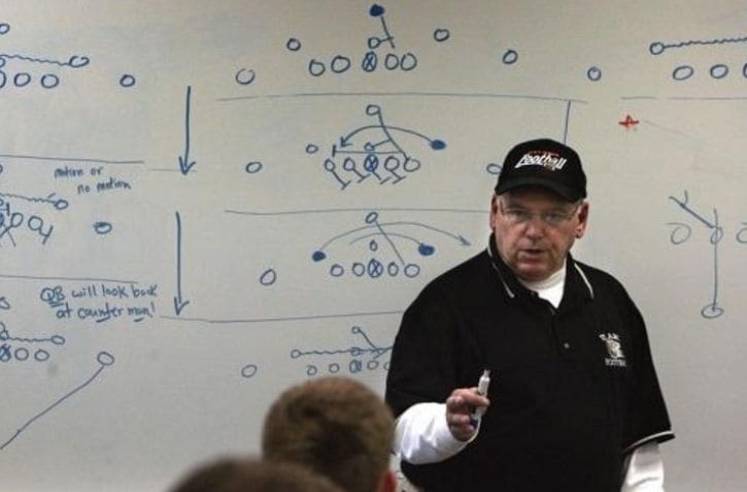
Has there ever been a professional sports team who walked onto a field without a playbook? If so, they probably had a horrible record.
Why? It’s because playbooks are a vital part of any team effort. The two go hand in hand. If there is a large team working towards a goal, then a playbook is necessary.
While sales is not sports, the two share similar traits. Both have a team, and those team work towards a goal. Therefore, a playbook is needed.
Seems logical.
But not every sales organization utilizes or even creates a sales playbook. The reasons why vary. Some sales managers simply don’t have the time to create one, some don’t know how to start, and some just don’t see the purpose.
Regardless of the excuse given, it is undeniable that having a playbook is useful.
Why the Need for a Sales Playbook?
To begin with, we need to know the purpose behind a sales playbook, and the purpose is linked with a who. So, who is the sales playbook being created for? Obviously, it’s the sales reps, but more specifically, a sales playbook should be created with the new sales reps in mind.
When sales managers focus on creating a sales playbook for new hires, the playbook takes on an added purpose. Veteran sales reps in the company are familiar with processes and they have adapted and implemented their own twists to improve sales processes.
New hires don’t have the same confidence. They are struggling to get into a rhythm where they can consistently hit numbers. This moment of confusion becomes a problem in their onboarding. Without some guide to assist them, odds are their first impression of a company is confusing and disheartening, and this increases the chances they will perform worse and seek to join another company.
Furthermore, as sales becomes focused on technology, there is a need for sales to be consistently delivering predictable results. A chaotic work environment where everyone is calling their own shots means that the month’s results are a dice roll.
The only way repeatable success can happen is if sales reps are unified in a collective approach to sales. A sales playbook can become that foundation for consistent growth.
Simply put, an effective playbook will do the following:
- Reduce turnover
- Create uniformity
- Promote collective growth
- Drive revenue
- Prevent miscommunication
- And create repeatable success
And what sales manager wouldn’t want that?
What is the Framework of an Effective Sales Playbook?
In other words, what should I put into a sales playbook that will accomplish the outcomes mentioned above?
The focus of the playbook should be around the processes of the sales team. Meaning, the playbook focuses more on actions, but it is important to include information that gives sales reps a comprehensive look at how sales fits within the company.
Here are 10 topics that should be covered in a sales playbook:
1. Company Overview
Good candidates for a job will walk into interviews with sales managers having a foundational understanding of the company they hope to work for.
But a surface level understanding of the company won’t adequately prepare them for the culture, processes, and coworkers they are about to face.
This is a chance to help a new hire understand the overall company strategy and how sales fits in with it. Some elements to consider are an overview of history, growth, goals, hierarchy, and culture.
2. Product Overview
A sales rep that sells a product they don’t understand is a close equivalent to a snake oil salesman. While a good sales rep knows how to sell, that doesn’t mean they understand the product being sold.
The purpose of including a product overview is more for the sake of new hires. Giving them an in-depth understanding of what the product is will vastly improve their confidence when interacting with potential customers.
3. Target Audience
Knowing the product is only the first step, the next is knowing where that product fits best. Knowing the product is like understanding the dart, but the target audience is the bullseye.
A target market guides the focused efforts of sales reps.
Give a description of who the target audience is. What’s the company size? What role in the company are you trying to contact? Who will the product help and—more importantly—who are the decision makers?
Bear in mind that a product can have many target audiences across a variety of demographics. But changes in demographics also require a change in approach.
4. Buyer Personas
Buyer personas are useful to sales reps because it gives an example of the target audience. The different personas can be fictional or real life examples encountered by sales management. Either way, the buyer personas help sales reps visualize the individuals they are selling to. They humanize the raw data of target audience demographics.
The buyer personas should detail the frustrations of the target audience. By telling a story about the target audience, sales reps can see just how a product can be a benefit to the person in question.
5. Discovery Questions
How should sales reps quickly identify if the person they are engaging with is first the target audience and second worth pursuing the time and energy to engage with?
Discovery questions are the initial stages of interaction with potential clients. They seek to do three things:
- Identify if it’s the right person
- Understand their challenges
- Empathize with their plight
Giving examples of how to do these three things will help sales reps move through the initial stages quickly. It will also help sales reps focus more on listening to potential clients and preparing unique value propositions rather than just pitching cookie-cutter talking points.
6. Sales Processes and Stages
The sales process has stages that take a potential customer from first contact to sale. Those stages can be the initial stage, demo, price negotiation, close sale and many more. Whatever it is, map out what journey the sales rep will need to go on to create a positive experience for potential clients.
List out activities in the initial stage like touch cadence. How often should a sales rep attempt to contact a potential client? What medium should that contact be in?
Email campaigns are a part of sales processes and stages. List out what emails should include, how often they should be sent, and how to recognize if a potential client is interested.
Throughout the sales process, customers will have objections. Give sales reps a variety of examples of what objections they may face and the best responses to help ease concerns.
The sales processes and stages should take up a large portion of the sales playbook because there is so much information that needs to be packed in it. This is the day-to-day activities of each sales rep, so be sure to empower them with enough information to make these processes as smooth and efficient as possible.
7. Pricing
Sometimes a sales rep can go rogue and offer a price that was never approved of by sales management. And sales management doesn’t have time to evaluate every single price negotiation. Thankfully the options aren’t just letting sales reps set their own gut-based prices or micromanaging every interaction.
By giving a pricing guide, sales managers can give set boundaries for sales reps to run around in. While there may be rare instances where a sales manager will need to approve certain prices, overall sales reps should be autonomous while setting prices during negotiation.
8. KPIs
Key performance indicators (KPIs) will give sales reps an idea of what activities are considered the most important for success. It will also be the focus of sales management during personal interviews so sales reps won’t be caught flat-footed.
9. Technology, CRM, Tools
Sales processes are becoming intertwined with different technologies so that the two are almost synonymous. If sales reps don’t understand the technology used by the sales team, then they won’t understand the processes either.
The sales playbook should detail what tools are at the disposal of sales reps and the best way to use them. Stress the importance of tracking data and interacting with the systems. Without information input from sales reps then sales managers will be clueless as to what is going on and how processes can be improved.
10. Competitive Analysis
“If you know the enemy and know yourself you need not fear the results of a hundred battles,” is a quote from Sun Tzu in “The Art of War.” So far, the sales playbook has information to help sales reps know the company (yourself) but what about competitors (the enemy)?
Keeping a pulse on competitor’s growth and strategies is worth mentioning in the sales playbook because they are a key factor in determining how to out-message them.
What are the Traits of Effective Sales Playbooks
The previous two sections addressed the why of sales playbooks and what should go in them. But all that knowledge is useless if it isn’t presented correctly. As the saying goes, “presentation is everything.” Here are some traits a sales playbook should have to be successful.
Succinct
Keep it brief.
Why?
People have low attention spans.
Big paragraphs make it hard to find important information
And it’s boring to read a lot about workplace policies.
Flexible
A staple strategy in the National Football League (NFL) is the audible. In the NFL, a quarterback can choose to change the current play to a different one in response to the enemy team’s defense. Some of the best quarterbacks were ones who utilized audibles correctly.
“A quarterback needs to have options out on the field and the ability to move from a play that could yield a negative result,” said BJ Kissel at Bleacher Report.
Sales reps are like quarterbacks; sometimes they need to make a call that goes outside the playbook to prevent a negative result. While it is good to have a structured process, this doesn’t mean everything has to be “by the book” in every situation.
A good sales playbook is one that equips sales reps with a wide variety of tactics and strategies which gives sales reps the flexibility to call an audible.
Transparent
Few things are more relieving to a sales rep then knowing the expectations of sales management have been met. However, not knowing what is expected creates anxiety.
Being transparent with expectations and processes can go a long way in helping sales reps feel at ease in the workplace. Don’t hold back information or details that would be pertinent to sales reps.
This also means sales management needs to commit to the sales playbook. If a sales rep is following the proper protocol but still failing, then perhaps the error doesn’t lie with the sales rep, but rather in the sales playbook itself.
Digital
Sales has come a long way. Once sales reps would drive across the country knocking on doors while holding a briefcase that contained the information they needed to sell right. Now sales reps spend much of their time in front of screens while making phone calls and sending emails.
The sales playbook should adapt to this shift. A digital copy provides easy access and can even help when searching for information. Furthermore, research shows that future generations are showing a greater interest in electronic mediums.
However, hard copies still have their merit. Some studies show that reading print leads to higher retention rates and is better for those with sleep problems.
With that in mind, creating a digital and a hard copy of the sales playbook is worth considering.
Developing
There should never be a “final draft” of the sales playbooks. A developing sales playbook is one that is constantly looking for input on how to improve or adapt.
As market trends change, sales playbooks will need to be revised and an effective sales playbook is one that avoids becoming stagnant.
To get the most out of updating the sales playbook, have sales reps share insights into how it can be improved. By sharing ownership of the sales playbook with the entire sales team, sales management can simultaneously improve the effectiveness of the playbook and boost retention of the content amongst sales reps.





